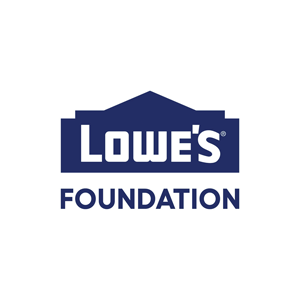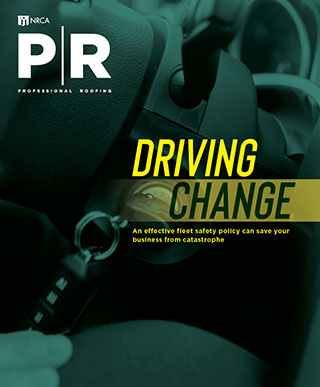Lowe’s® Foundation to fund grants for skilled trades training
 |
The Lowe’s Foundation has announced nearly $8 million in grants to community and technical colleges throughout the U.S. to support skilled trades workforce development initiatives through its first round of Lowe’s Foundation Gable Grants. The grants are part of the foundation’s five-year, $50 million commitment to help prepare 50,000 people for skilled trades careers and will fund programs in appliance repair, carpentry, construction, electrical, HVAC and plumbing.
Some of the Lowe’s Foundation Gable Grants recipients include:- Coconino County Community College, Flagstaff, Ariz., which will expand its skilled trades training programs in construction, electrical, HVAC and plumbing. The school also plans to remodel its workshop to create more lab space; upgrade equipment, computers and software; and hire additional instructors.
- Columbus Technical College, Columbus, Ga., which will expand its reach with a new mobile unit to bring skilled trades training to students in rural communities, justice-involved learners and transitioning service members. The college also plans to build a four-week, fast-track construction career bootcamp to prepare participants for entry-level skilled trades positions.
- Mississippi Gulf Coast Community College, Perkinston, which will establish a construction trades training program at a local correctional facility and provide scholarships and internships for students in its skilled trades training programs.
“These deserving schools are transforming the skilled trades workforce through sustainable and inclusive career pathways. We had many outstanding applicants for these grants, which speaks to the urgency needed to increase the capacity for skilled trades labor nationwide,” says Janice Dupré, executive vice president of human resources at Lowe’s and chair of the Lowe’s Foundation. “Our grants are inclusive of all groups to ensure we achieve the goal of preparing 50,000 people for skilled trades careers in five years, including groups that are traditionally underrepresented in the trades, such as women, people of color, people in rural areas and individuals participating in second-chance programs. We are confident these college programs will strengthen the skilled trades infrastructure for years to come.”
In addition, the Lowe’s Foundation will invest at least $5 million more to assist community-based nonprofit organizations and national nonprofit partners with a strong local presence. Learn more about the Lowe’s Foundation at corporate.lowes.com/our-responsibilities/lowes-foundation.
GAF Energy recalls Timberline Solar™ shingles
GAF Energy, San Jose, Calif., has recalled its Timberline Solar shingles, according to the Consumer Product Safety Commission. The electrical components in the solar energy shingles reportedly can malfunction, posing a fire hazard.
The recall involves TLS-1 jumper modules and TLS-1 energy shingles installed as part of a residential solar energy system. GAF Energy has received one report of fire and five reports of thermal incidents resulting in property damage, including damage to the roof deck. No injuries have been reported.
GAF Energy will replace all jumper modules, check the electrical components of each solar shingle for defects and perform repairs for free. The company has been remotely shutting off affected systems until the remediation is complete, and consumers will be compensated for monetary losses resulting from the loss of solar energy generation during that time.
GAF Energy also is contacting known owners of affected products to schedule repair and replacement. If consumers have not been contacted by GAF Energy, they should contact their installers to determine whether their shingle components are recalled.
Additional information is available at cpsc.gov/recalls.
Atlas Roofing names Ken Roberts president
 |
Atlas Roofing Corp., Atlanta, has named Ken Roberts president following the retirement of Ken Farrish.
Roberts most recently served as president of Delta Faucet Co., Indianapolis. He held numerous positions in purchasing and manufacturing during a 30-year career at Masco Corp., Livonia, Mich., including president of Masco Canada. Roberts is known for his teambuilding and project management abilities.
Farrish served as president of Atlas Roofing for 20 years and brought about sustainable growth in the company’s four divisions.
Students receive Melvin Kruger Endowed Scholarships
 |
The Roofing Alliance has announced the recipients of its Melvin Kruger Endowed Scholarship for the 2023-24 academic year.
This year’s new scholarship recipients are:
- Evan Cady, son of Traci Cady, office manager for J&S Building Exteriors Inc., Attleboro, Mass.
- Aidan Carpenter, construction management student at North Carolina State University, Raleigh
- Cecelia Krumholz, daughter of Erik Krumholz, senior field consultant for Tremco Inc., Beachwood, Ohio
- Piper Lewis, daughter of Charles Lewis, project manager for Commonwealth Building Systems, Rockland, Mass.
- Marena Malone, daughter of Rica Malone, national account service representative for CentiMark Corp., Canonsburg, Pa.
- Brayden Morford, son of Robert Morford, senior chemist for SOPREMA® Inc., Wadsworth, Ohio
- Michael Nwaigbo, construction management student at University of Illinois, Chicago
- Alexis Petty, daughter of Jammie Petty, administrative specialist for Beacon Building Products, Herndon, Va.
- Hannah Redding, daughter of Lorie Redding, business manager for Tecta America East-Glen Rock, Glen Rock, Pa.
- Kennedy Stockton, construction management student at University of Arkansas at Little Rock
- Caylin Angel, who is attending Washington & Jefferson College, Washington, Pa.
- Cole Beyer, who is attending University of Minnesota, Twin Cities, Minneapolis
- Zackary Cekalla, who is attending University of Minnesota, Duluth
- Cade Edwards, who is attending Boyce College, Louisville, Ky.
- Davis Edwards, who is attending Huntingdon College, Montgomery, Ala.
- Julia Shanahan, who is attending Drexel University, Philadelphia
The Melvin Kruger Endowed Scholarship Program offers three scholarship opportunities. All categories are open to employees of roofing industry companies, their spouses and dependent children, as well as construction management students enrolled in undergraduate level or students enrolled in CTE programs or schools regardless of industry affiliation.
In addition, the Roofing Alliance renewed six Melvin Kruger Endowed Scholarships for the 2023-24 academic year. The recipients are:
The Roofing Alliance awarded $50,000 for new scholarships and $30,000 for scholarship renewals for the 2023-24 school year. To date, 159 students have received more than $1 million in scholarship awards.
Choose the right hard hat for the job
 |
The Bureau of Labor Statistics reports in 2020, there were more than 68,000 reported cases of head injuries in all industries, including traumatic brain injuries, which account for 20-25% of work-related trauma, according to For Construction Pros.
Severe traumatic brain injuries can result in permanent disability and affect an employee’s ability to return to work, as well as translate to lost productivity and long-term rehabilitation costs for employers. Hard hats are crucial to preventing such injuries, and it is important to be familiar with the types of hard hats.
Hard hats are rated by the following types and classes:
- Type 1: These hard hats help reduce the force of impact to the top of the head, such as tools falling from above, with a full brim encircling the hat.
- Type 2: These hard hats have short bills on the front and are designed to help reduce the force of an impact to the front, sides, back and top of the head, such as colliding with the side of a steel beam on a construction site.
- Class G (General): These hard hats protect against the impact of falling objects and electric shock from contact with low-voltage currents.
- Class E (Electrical): These hard hats protect against the impact of falling objects and electric shock from contact with high-voltage currents.
- Class C (Conductive): These hard hats protect only against the impact of falling objects and not against contact with electrical conductors.
- Bump caps: These hard hats are designed only to protect workers from injury if their head strikes an object, such as overhead pipes or beams, rather than protecting against falling objects.
When choosing head protection for workers, employers must consider the types of hazards workers face, as well as Occupational Safety and Health Administration Standard 1910.135, which provides general requirements for head protection in the workplace.
Additionally, according to a recent Construction Dive article, some contractors are switching from hard hats to helmets to better protect workers. Helmets have padding to protect from impact to the sides of the head, making them ideal protection against falls, as well as chin straps that help hold the helmet in place.
Tips for boosting recruitment and retention
 |
The Associated Builders and Contractors estimate 546,000 workers are needed on top of the normal hiring pace to meet construction labor demands in 2023.
The industry has had difficulty attracting workers. However, construction leaders who have invested in robust safety and wellness programs have seen significant shifts in worker satisfaction and retention.
Construction Executive shares the following worker well-being components to help companies recruit and retain workers:
- Safety and prevention. Workers want to know leaders care about their safety, so continuous improvement of safety and injury prevention is key. New PPE or safety technology shows workers steps are being taken to protect them. Leaders also can bring professionals such as occupational health nurses onto the job site to help workers perform more efficiently and improve morale.
- Access to quality health and wellness resources. Wellness programs that offer education and support for health—such as nutrition counseling or ergonomics assessments—keep workers engaged in their personal health and create a culture of well-being care. An on-site wellness cart can help remind workers about the importance of hydration and adequate sleep and allow them to check in with providers regarding mental and physical health.
- Environmental wellness. Workers are more motivated to come to work when the environment is welcoming and leaders consider their well-being. Some companies offer clean hygiene amenities, healthy food options, hydration stations and preventive health screenings. Even minor upgrades or perks can show prospective workers company leaders want to meet the demands of a modern workforce.



